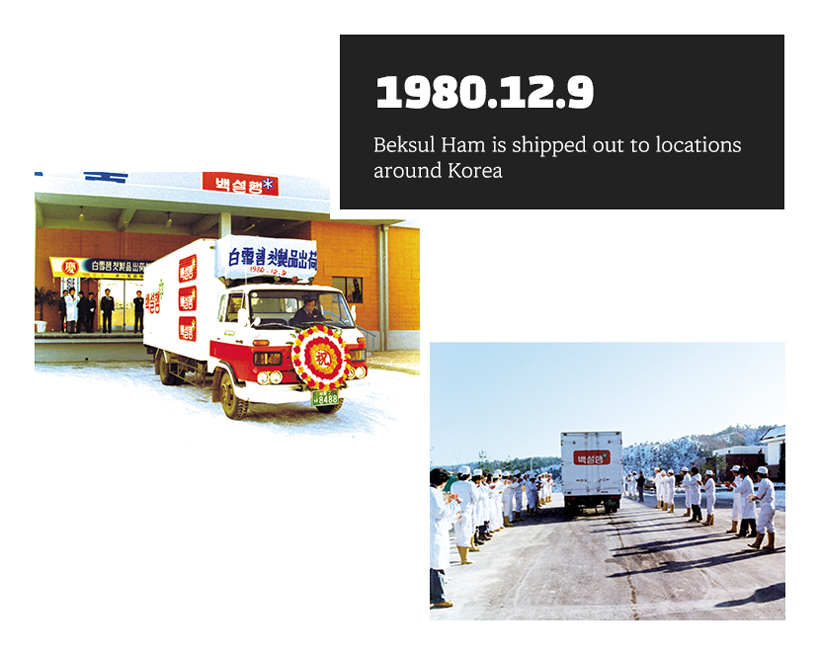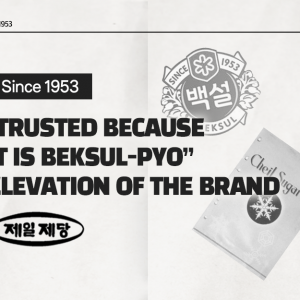Canned ham products have a unique place in Korean food history, and CJ CheilJedang played an important role in their development.

As times have changed, so has the perception of ham products in Korea. In place of cheap sausage with a low ratio of quality ham, Koreans began to favor hams made with higher proportions of meat with meaty flavors. Since the beginning of this food trend’s evolution, CJ CheilJedang has played a key role in it, and the company’s Beksul Ham has long been enjoyed by Korean consumers for its taste and quality. Today, CJ Newsroom takes a look at this history.

CheilJedang Enters the Meat-Processing Industry

CheilJedang first considered entering the meat processing business in 1974. This was a time when the eating habits of Koreans were becoming more westernized, with meat consumption rapidly increasing from 7.7 kilograms of meat per capita in 1976 to 10.2 kilograms in 1978. A general preference for beef was also expanding to include pork and chicken.
CheilJedang decided that this juncture – when food production was becoming both more simplified and more sophisticated – was an opportune moment to enter the processed meat industry. At the time, Korea was exporting pork to Japan and other countries, so it was already a fruitful business area for Korean companies looking to establish themselves. To help enter the industry and lay the groundwork for its new business, CheilJedang built the country’s largest pig farm in Yongin.

In December 1979, CheilJedang established a meat processing business team within its Planning and Development Office. At the time, there were not enough meat processing facilities and technologies available in Korea. However, it still had the potential to become a promising business if the right facilities could be established as the market demand actively explored.
Beksul Ham: CheilJedang Exceeds KRW 10 Billion in Sales in Korean Meat Processing Industry First

In December 1980, CheilJedang’s first processed meat product was released. For the name, CheilJedang chose ‘Beksul Ham,’ which capitalized on the strong recognition enjoyed by CheilJedang’s ‘Beksul’ brand.
Within a year of launching Beksul Ham, CheilJedang had become the leader in Korean livestock products, boasting a 34.8% market share. This was an impressive accomplishment, particularly for a company that was late in entering the meat processing industry relative to its competition. By 1982, CheilJedang’s market share in livestock products had jumped to 49%: an increase of more than 100% from the previous year. Specifically, its mixed meat products achieved a market share of nearly 50%.
Based on this success, CheilJedang became the first company in Korea’s meat processing industry to surpass KRW 10 billion in sales within two years of its launch, making it the number one company in the industry. This also marked a broader milestone in the Korean meat processing market, which had previously been dominated by mixed meat predominantly made up of fish.
CheilJedang Produces Its Own Spam, Making the Product More Accessible to Korean Consumers

In March 1986, CheilJedang took the next big step in its meat production business by signing a licensed production agreement with American meat processing company Hormel. This agreement would allow CheilJedang to introduce Spam to more Korean customers. Up until that point, Spam had been seen as a luxury food item in Korea, eaten mostly by the wealthy and by members of the U.S. military stationed in the country.
With CheilJedang’s commencement of Spam production in Korea, it quickly became readily available at local supermarkets, bringing the canned ham to more Koreans than ever before. In 1987 – CheilJedang Spam’s first year of business – the company sold 500 tons of Spam, far exceeding expectations. The following year, sales doubled.
The company’s first advertisement slogan for its Spam was “Global reputation, global quality! CheilJedang makes Spam.” The words conveyed more than just brand messaging. They were a demonstration of the pride the company felt that Korea, as a rapidly growing economic success story, was now capable of making and producing globally recognized products like Spam. With the added tagline “A slice of Spam over hot steamed rice” emphasizing the product’s place in Korean cuisine, CheilJedang Spam soon became synonymous with canned ham in general in Korea. CheilJedang had successfully cemented its leading position, and was set on maintaining it.
CheilJedang’s Quality Recognized Through the 1986 Asian Games and 1988 Seoul Olympics
In November 1985, CheilJedang was selected to bear the Olympic insignia during both the 1986 Asian Games and the 1988 Seoul Olympics. At the time, the right to bear the insignia was only granted to one company per event, so CheilJedang’s selection represented an official recognition that its meat products were the high point of Korean quality. In 1990, CheilJedang became the first company in the Korean food industry to win the grand prize in the quality assessment of the German Agricultural Cooperative (DLG).
CheilJedang Meets Health and Well-being Trends With New Products

Since the early 2000s, ‘well-being’ has been a popular buzzword in Korea. Consumers’ desire for safer, healthier foods was constantly growing, and this was especially true when the issue of food additives emerged as a new concern for customers. Recognizing customers’ concerns about the issue, CheilJedang met the challenge head-on, driving freshness, health and additive-free products as brand priorities. In 2007, it launched ‘Freshian,’ a new brand for fresh foods, with each product ensuring customers that “We use only safe and reliable ingredients.”

In May 2010, CheilJedang launched a new Freshian product: ‘The Healthy Ham.’ After five years of research and development, six food additives – including sodium nitrite, synthetic flavors and synthetic preservatives – were all removed from the production process, resulting in this new, healthier meat offering. The repurchase rate was particularly high among young mothers, as it spread through word of mouth that the ham was suitable to feed to young children.
Leading the ‘no additives’ trend in Korea, The Healthy Ham achieved over KRW 10 billion in sales within six months of its launch and surpassed KRW 100 billion in cumulative sales within 28 months. It was the first brand in the Korean refrigerated ham market to surpass KRW 100 billion in cumulative sales in less than three years.

Throughout the evolving status of ham products in Korea, CheilJedang has been there every step of the way. As meat products like Beksul Ham, Spam and The Healthy Ham took their place in the minds of Korean consumers, ham went beyond being a simple side dish for rice to become a new and iconic way for Koreans to enjoy meat.



